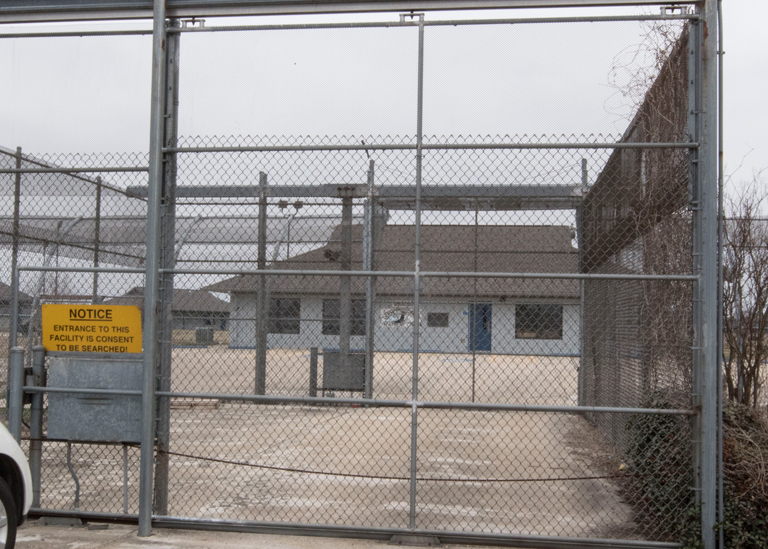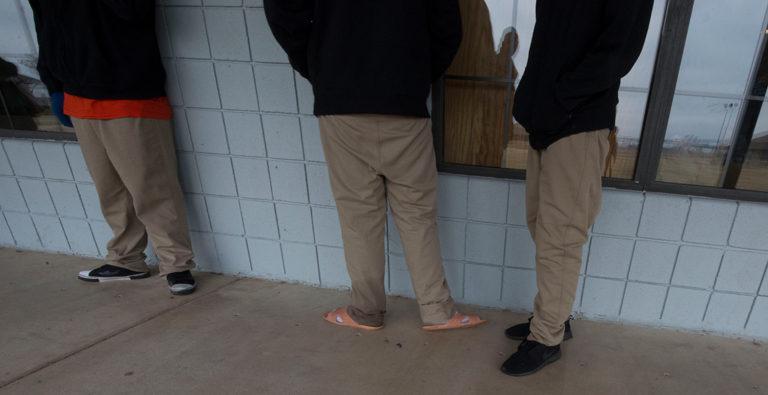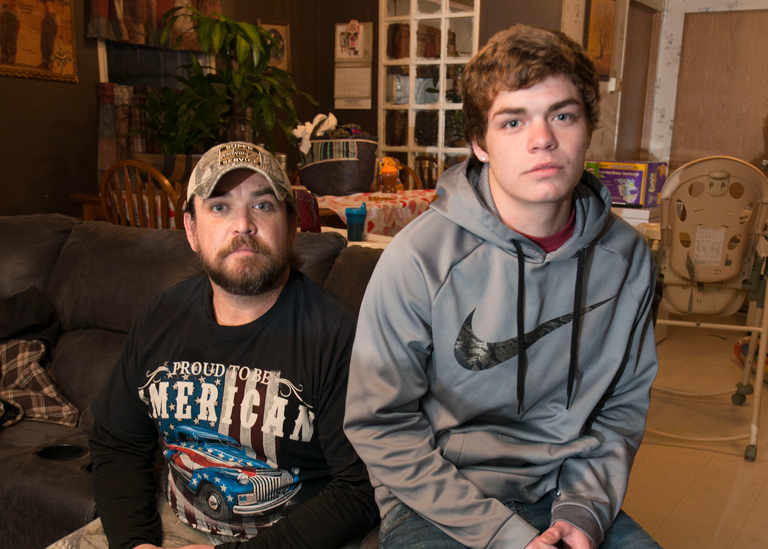(Part 2 of 3)
Arkansas Nonprofit News Network
Teenagers confined to two state-run South Arkansas juvenile lockup facilities lived in unsafe and unsanitary conditions for much of 2017, an Arkansas Nonprofit News Network investigation has found.
Nine current and former workers at the juvenile facilities, in Dermott, told the Arkansas Nonprofit News Network that air-conditioning only worked sporadically in multiple dormitories throughout the summer, when the outdoor temperature often approached 100 degrees. The heating units in multiple dorms did not function for weeks in the winter, when temperatures dipped below freezing. The facilities also did not provide the youths sufficient hygiene supplies, adequate shoes or coats for prolonged periods in 2017, a previous report from the Arkansas Nonprofit News Network detailed.
Charges of neglect
Senior staff at the Arkansas Department of Human Services' Division of Youth Services (DYS) said that their records did not reflect extended outages of air-conditioning and heating units. But DYS Director Betty Guhman conceded serious problems existed at the Dermott facilities. "We realize that some things have slipped between the cracks, and we don't want that to happen. We want to stay on top of it."
The systemic breakdowns alleged by staff amount to neglect, said Tom Masseau, executive director of Disability Rights Arkansas (DRA), a nonprofit advocacy group that is federally designated to monitor state juvenile lockups.
Masseau said that if the state held juvenile lockups to the same standards as it does for long-term care facilities for the elderly and developmentally disabled, the lockups would be forced to shut down. He said if the DYS did not improve conditions at the Dermott facilities, DRA would consider filing a lawsuit in federal court.
The Dermott Juvenile Treatment Center for 13- to 17-year-old boys is one of seven juvenile lockups referred to as treatment centers by the DYS, which oversees them. As the name suggests, treatment facilities are intended to be rehabilitative rather than punitive. Youths committed to the facilities must complete treatment plans designed by the DYS, rather than time-based sentences. Under state supervision, they are referred to as "clients" rather than "inmates." The nearby Dermott Juvenile Correctional Facility houses 18- to 21-year-olds who were committed to a treatment center as juveniles but have not yet completed their treatment plans.
Broken freezer, oven
In January 2017, at Gov. Asa Hutchinson’s direction, DYS took direct control of seven of eight youth jails, including the facilities in Dermott, after efforts by the state to contract them out to a new vendor were blocked in the legislature in December 2016. The state had not directly operated the facilities in more than 20 years.
Disability Rights Arkansas visited the Dermott facilities in December and noted its findings in a Jan. 19 letter to Guhman that painted a picture of squalid conditions. It said a large portion of the cafeteria was covered with standing water. It described the showers as extremely dirty with mold and mildew. One residential unit lacked hot water; another lacked working heat. Two units had broken glass in their entryways.
At the juvenile treatment center, DRA found a broken freezer, ice-maker and griddle; one nonworking oven and another that had to be propped closed by a chair; a clogged garbage disposal; an industrial fryer that did not work consistently; and a sink leaking hot water. The letter also said that a source at Dermott said some dorms lacked heat.
In a letter in response to DRA, Guhman contested many of the advocacy group's findings and conceded others. She said a plumber had been dispatched to fix the standing water issues. (A DYS spokesperson later told a reporter that a pipe had burst the day of the DRA visit and had been fixed the same day. On a Feb. 12 visit to the treatment center, a reporter observed a large puddle of standing water in the bathroom of one dorm.) Guhman said the griddle and the ovens worked, but the freezer and ice-maker needed to be replaced and delivery was expected by Feb. 9. (The replacement freezer and ice-maker had not arrived by Feb. 12.)

The barrier surrounding the Dermott Juvenile Treatment Center.
"All the dorms have adequate heat ..." she wrote. "When furnaces did go out in one section of the Juvenile Treatment Center, a repairman was called immediately and repairs made the same day."
But current and former staff said multiple dorms were without heat for long periods earlier this year.
"The heat just got fixed," one staffer at the correctional facility said in a Jan. 29 interview. "When we had that snow and stuff down this way, the kids were complaining because they didn't want to stay in their dorms, because they were cold."
No steady air-conditioning
K. Knuckles, 16, was committed to the Dermott Juvenile Treatment Center in April 2017 and released in October. (Because he is a juvenile, the Arkansas Nonprofit News Network is identifying him by his first initial only). Throughout the summer, he said, when temperatures regularly exceeded 90 degrees, the air-conditioning in the Alpha dorm, where he lived during his stay at the treatment center, did not work.
Former staffer Jimmie Bynum said the air-conditioning in all five of the dorms at the correctional facility only worked sporadically throughout the summer. Antonio Willis, another former direct care staffer at the correctional facility, confirmed Bynum's account.
"We had this one kid, where, he almost fainted in his room from being so hot," Willis said, "so the lady in the cafeteria bought him a fan to plug up ... and put in his room, but he couldn't do it because [a supervisor said it was] a fire hazard. But he threw his fit and [the supervisor] ended up letting him do it. But he was the only kid in the whole dorm room with a fan. So you know how that made the other seven kids feel who didn't have a fan, who had to sweat their asses off at night."
Bynum said during the day, staffers would open the outside doors to let in air, but that also let in mosquitoes.
The doors in multiple cells in the correctional facility were broken and couldn't be locked, current and former staffers said.
"I've noticed that they've been sliding the benches up against the cell doors" to keep them closed, one current staffer said. The worker said some doors were difficult to close, some were hard to open, and keys had been broken in some of the doors. Bynum said keys had broken off in doors, leaving residents trapped inside their rooms for as long as two or three hours.
Rats and roaches
In Disability Rights Arkansas's Jan. 19 letter, the advocacy group said staffers had complained of rats in the kitchen. In her response, DYS Director Guhman said that "due to the location of the facility in a rural area surrounded by a field, field mice do get in buildings," but she said a pest contractor would put locked bait boxes in the facilities and surrounding fields. Later, Guhman told a reporter unequivocally that there were no rats at the facilities.
But former correctional facility staffers Bynum and Willis said they regularly saw rats in the cafeteria and that rats would often reach the trays left for guards in the cafeteria before the guards could.
"They would make us trays and sit them on the counter, and by the time we got our trays there would be ... holes in our trays [from the rats]," Willis said. Bynum said staffers found food missing and rat feces on their trays. He said rats were found in the kitchen's flour and sugar supplies. "When they get caught in there, you would think they would dump the whole thing, but they wouldn't," he said. A current staff member said she had seen rats running in and out of clients' cells and that rats in the dining hall were "out of control."
Willis said one of the clients he was monitoring found a roach in his food one day. He said a cafeteria worker was unmoved. "It's just a bug," she told him, according to Willis. Bynum said he had seen a client served a plate with a dead roach on it.
Repairs needed
Multiple current and former staffers also said toilets were regularly clogged in the correctional dorms and the showers in several dorms lacked hot water for weeks.
Gov. Hutchinson made an unannounced visit to the facilities Jan. 29 after reading the DRA letter. He made a similar visit to the Arkansas Juvenile Assessment and Treatment Center early in his administration.
After visiting Dermott, he said, "My impression is that we need to monitor the maintenance of the facility closely. Some of the damage is by the juveniles who are in custody and some of the damage is through ordinary wear and tear. In either circumstance, essential repairs need to be made in a timely fashion. The weather was cold on the day I was there, and I observed the juveniles wearing coats and the buildings were warm. There were previously unnecessary delays in purchasing some items, and the DYS leadership has indicated this problem has been addressed."

Youth outside a building at the Dermott Juvenile Treatment Center
State Sen. Eddie Cheatham (D-Crossett) and Rep. LeAnne Burch (D-Monticello) also visited the facilities Jan. 29. In an email, Burch said, "[M]y general impression was that the facility for the older juveniles seriously needs immediate attention. It was dreary as a whole, and several areas needed real, concentrated effort for safety and simply for general maintenance." She said she spoke with Guhman after the visit and was assured that DYS was working to make repairs and upgrades. "I'm hoping to see a measured improvement in very short order," Burch said.
Cheatham and Burch also toured the Delta Regional Unit of the Arkansas Department of Correction, which is across the street from the juvenile correctional facility and within sight of the treatment center. Prison-managed farmland surrounds both juvenile facilities with little else on the horizon.
Cheatham said he found the adult prison to be nicer than the juvenile facilities.
"It was a world of difference. [The prison] was clean, well-lit, orderly. ... [The juvenile facilities] just need to be cleaned up."
After the conditions his son endured in Dermott, including living without adequate hygiene supplies and sleeping in a dorm without air-conditioning throughout the summer, Benjamin Knuckles said he didn't see the rehabilitative component of the Dermott lockup.
"That wasn't nothing but just a prison for kids," he said. "It wasn't a treatment facility."
That conditions at the Dermott facility have not improved after a year of state control is a sign that lawmakers need to take a closer look at the juvenile system, Masseau said.
"I think the only way this is going to change is for the legislature to take a stand. We continue to pour money into the division with no increase for infrastructure and buildings are falling apart. There's no one holding anyone accountable for these issues," he said.
Benjamin Hardy also contributed to this article.
This reporting is courtesy of the Arkansas Nonprofit News Network, an independent, nonpartisan news project dedicated to producing journalism that matters to Arkansans. Find out more at arknews.org.
[Related: Part 3 - Sexual Assault, Suicide Attempts at 2 Understaffed Arkansas Lockups]
